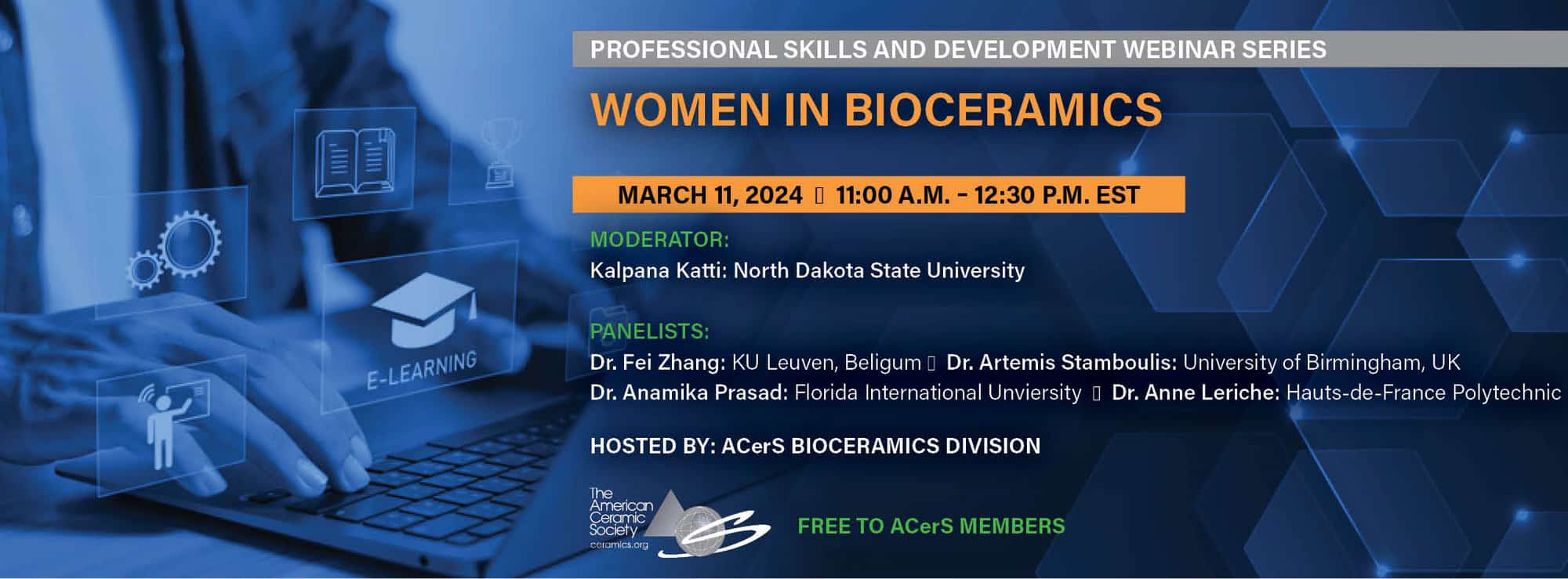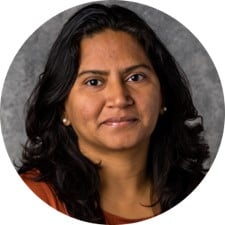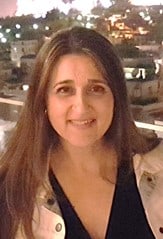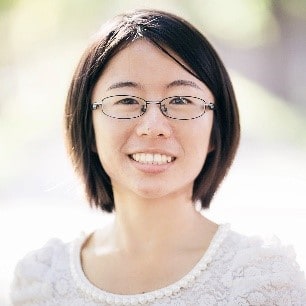Bioceramics Division Webinar: Women in Bioceramics

Hosted by: ACerS Bioceramics Division
Monday, March 11, 2024; 11a.m. – 12:30p.m. Eastern US time
Sponsored by the ACerS Bioceramics Division, the March webinar will feature a panel style discussion on Women in Bioceramics.
PANELISTS BIOGRAPHIES

Dr. Anamika Prasad – Florida Atlantic University
Anamika Prasad is an Associate Professor in the Biomedical Engineering Department at Florida International University (FIU). She has a joint appointment with the Mechanical and Materials Engineering and also serves as Diversity Mentor Professor with AWED (Advance Women, Equity, & Diversity).
Dr. Prasad previously served as Assistant Professor at the South Dakota State University (SDSU) Department of Mechanical Engineering. She received her Ph.D. from MIT, postdoctoral training from Stanford University, and has over four years of industry experience. Dr. Prasad’s research is at the intersection of materials science, structural mechanics, and biological systems, with an application focus on biomedical engineering, aerospace composites, sustainable materials, and biomedical devices for precision agriculture and healthcare. Her current research interests include bioinspired next-generation composites, bone tumor mechanics, plant biomechanics, and sustainable materials design. Dr. Prasad has received approx. $1.2 million grant, including NSF CAREER award 2021 and the DOD’s DURIP grant. Her work has been highlighted by multiple outlets, including Newswise, Physics.org, Acta Materialia, Air Force Research Lab, and University publications. Beyond research, Dr. Prasad is keen on using materials education as a vehicle for STEM workforce development, current focus on rural and Native American communities.
Dr. Anne Leriche – Hauts-de-France Polytechnic University
Professor Anne Leriche received her PhD degree based on thesis work in Engineering ceramics at Mons (Belgium) and at Leeds (UK) universities, with “summa cum laude” in 1986. She joined the laboratory advanced ceramic materials and processes from the University of Valenciennes (France). She became full professor in 2005. She led the lab from 1999 to 2016, leading numerous researches sponsored by European Union. She advised 26 PhD students, authored 208 peer-reviewed research papers and had been co-inventors of 3 patents.

She has made outstanding contributions in the field of Engineering Ceramics and lately on Bioceramics. On fundamental science aspect, she has developed early understanding in the community as how to control microstructure and extend her knowledge to establish microstructure-property correlation in a range of structural ceramics. Another notable contribution has been to process calcium phosphate bioceramics with tailored porosity and interlocking microstructure, using a combination of pore former, freeze casting and additive manufacturing. She served as President of French Ceramic Society (2006-2016), President of ECerS (2013-2015) and President of JECS Trust (2010-2011; 2015-2017). She organized a series of ECerS summer schools, since 2013. Prof Leriche is an elected Fellow of the European Ceramic Society, World Academy of Ceramics and American Ceramic Society. She also received ECerS Stuijts Award (2017) and the first ECerS-ACerS Award (2020).

Dr. Artemis Stamboulis – University of Birmingham, UK
Professor Artemis Stamboulis obtained her PhD from the Department of Chemical Engineering at the National Technical University of Athens, Greece in Polymer Engineering working on the development of electroconductive o, m, p-polyphenylenes and their composites with carbon and aramid fibres for electromagnetic shielding. She received a Marie Curie Fellowship to work at the Department of Materials at Imperial College London to develop polypropylene composites reinforced with natural fibres followed by two other postdoctoral positions at Imperial College, working on the development of bioactive glasses for tissue engineering and dental cements.
She held a lecturing position at the University of Ulster in Belfast, followed by a prestigious Birmingham Fellowship a year later to start a biomaterials research group at the School of Metallurgy and Materials, University of Birmingham. She obtained her chair in Biomaterials in 2022 and is currently working on the development of antimicrobial materials funded by Horizon 2020, Horizon Europe and UKRI. She is a Fellow of the Institute of Materials and a Fellow of the Higher Education Academy.
Dr. Fei Zhang – KU Leuven, Belgium
Fei Zhang (born in Yunnan China, mother of two kids) received her B.S. from University of Science and Technology, Beijing in 2009. She obtained her Master degree (2011) and Ph.D. (2015) in Materials Engineering from KU Leuven. She joined the MATEIS laboratory in INSA-Lyon, France for 1 year in 2017. She was granted with FWO postdoctoral fellowships to work on additive manufacturing of bioceramics from 2018 at KU Leuven.

Since 2023, she received a research professor position with a 50/50% joint appointment at Materials Engineering and Oral Health Sciences departments at KU Leuven. Her interdepartment position has a broad scope of interdisciplinary research bridging materials engineering & dentistry.
Her research has been focusing on the development of reliable bioceramics with prolonged clinical longevity. She has published more than 50 peer-reviewed scientific papers with more than 2500 citations and h-index of 28 according to google scholar. Her Ph.D. work on the aging stability of dental zirconia was awarded with “Best PhD Thesis” by the Belgian Ceramic Society and as well as the “Outstanding Self-Financed Students Abroad by Chinese Government Award”. More recently, she also received the Global Young Bioceramicist award from the American Ceramic Society.
REGISTRATION
Registration is now closed. If you missed the webinar, ACerS members may view it upon logging in. Member log-in required.
If you have any questions, please contact Vicki Evans.
This webinar is brought to you by the ACerS Bioceramics Division.